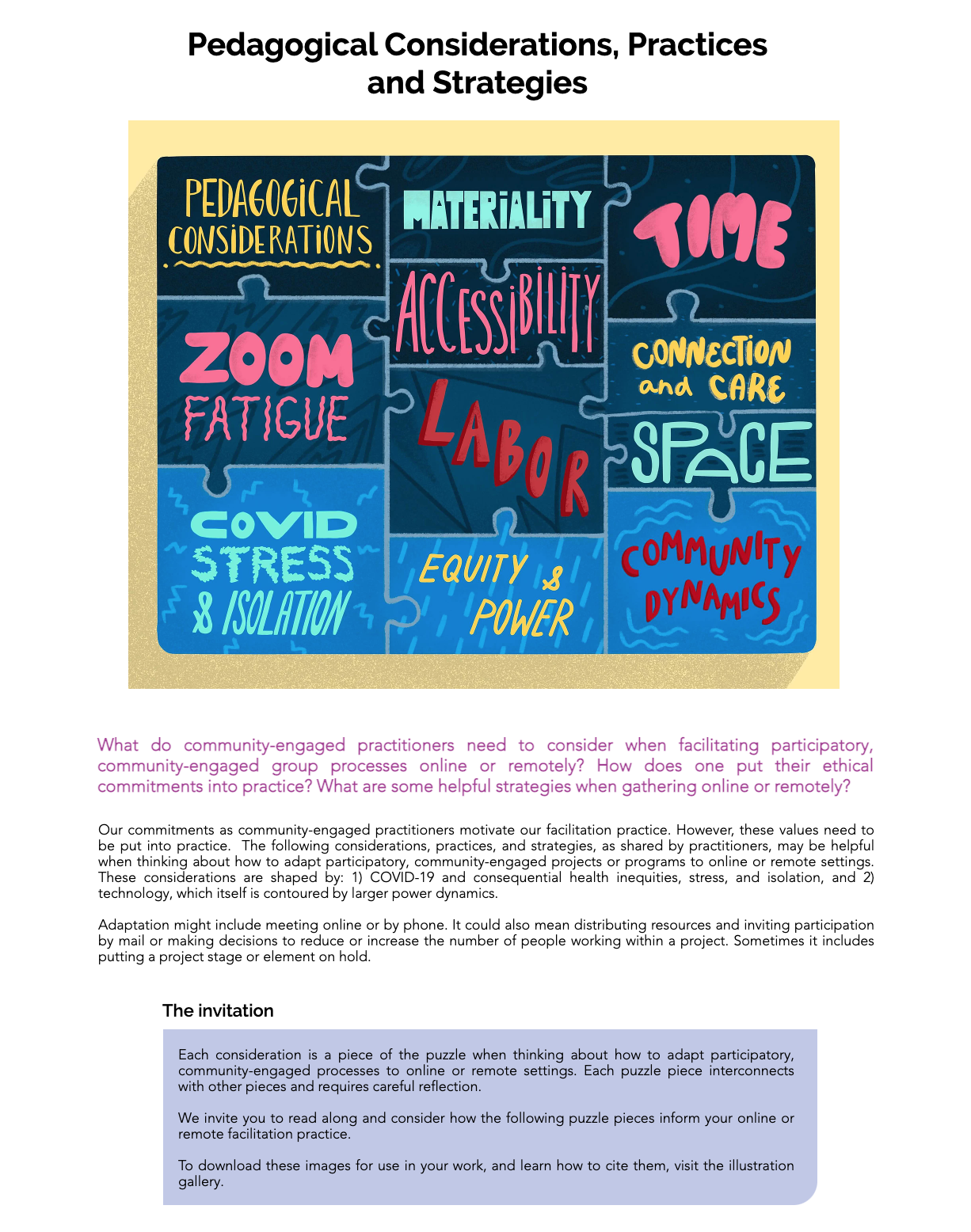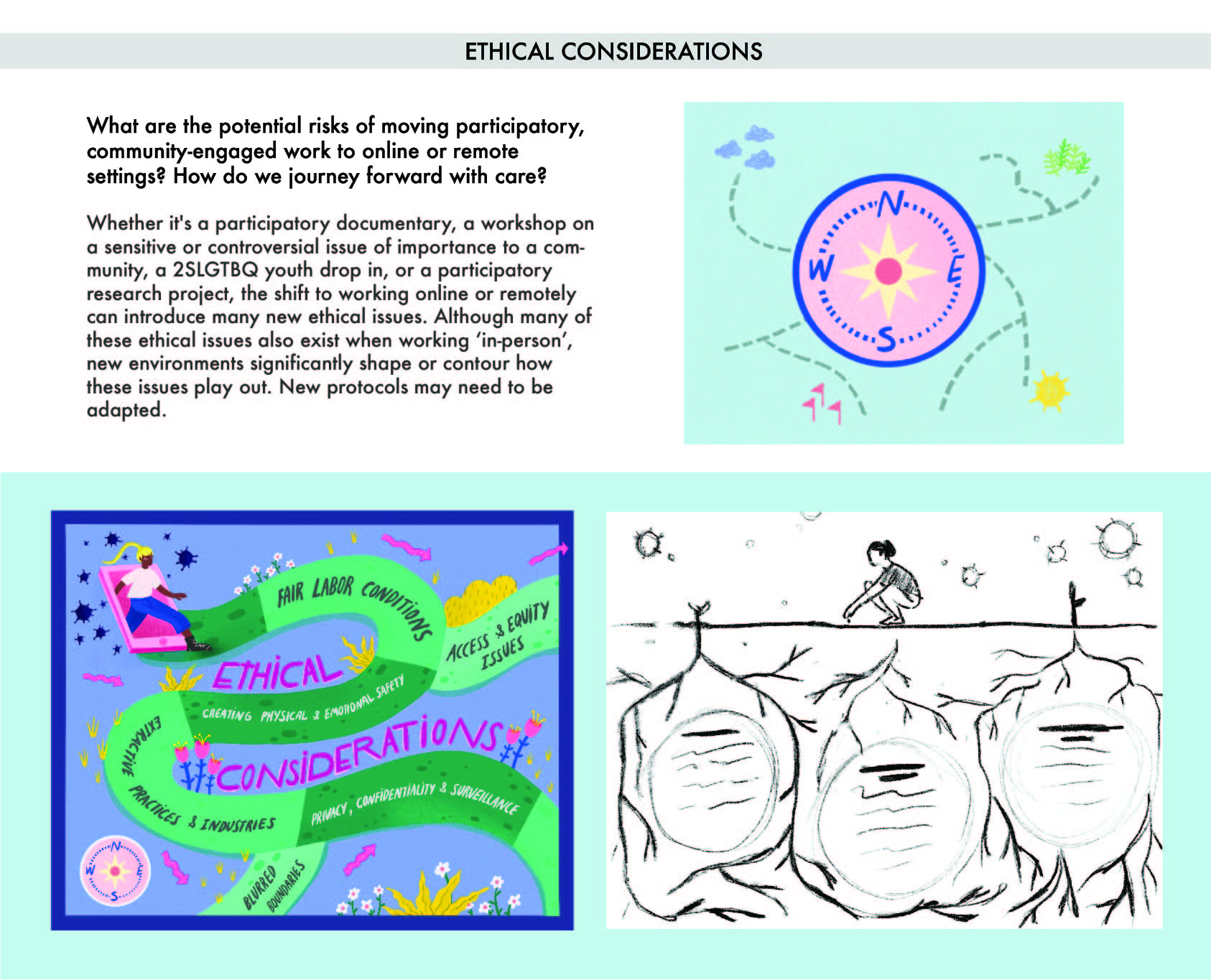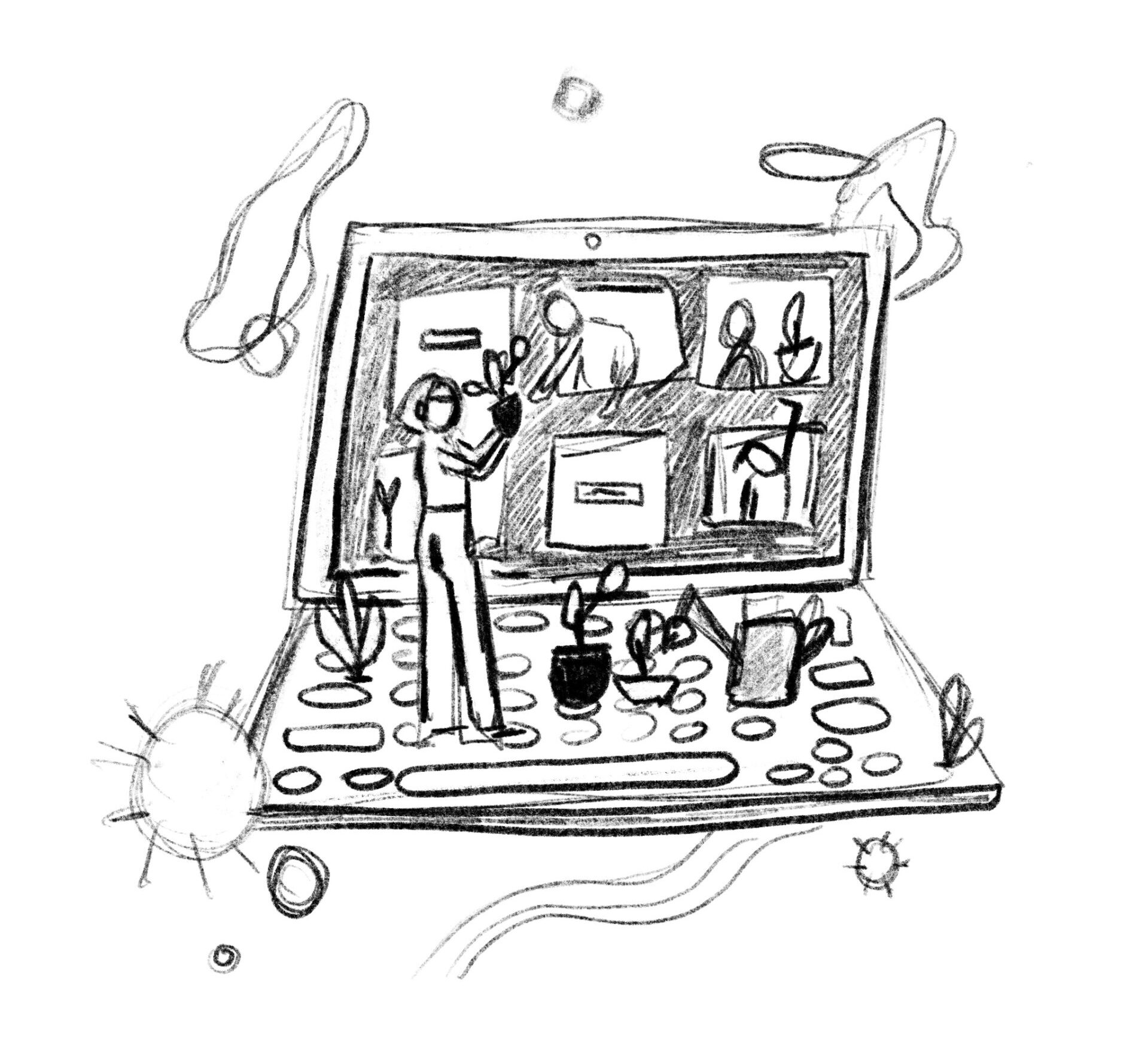Beyond the Toolkit
Beyond the Toolkit: Exploring Digital and Remote Facilitation in COVID-19
Andrea Vela Alarcón
Curriculum, Teaching, and Learning (OISE, UTSG)
Sarah Switzer
Curriculum, Teaching, and Learning (OISE, UTSG)
Rubén Gaztambide-Fernández
Centre for Urban Schooling (OISE, UTSG)
Beyond the Toolkit is a highly-collaborative project. To learn more about our team, visit: https://www.beyondthetoolkit.com/the-team.
Overview
Beyond the toolkit is an illustrated and audio-visual web-resource that shares findings and resources as informed by the pilot study and virtual event series, “Community Engagement in COVID-19”. The pilot study explored how community-engaged practitioners (participatory research, community arts, participatory visual methods, and community facilitation) have adapted their participatory work to online and remote settings, as a result of COVID-19, and the unique ethical and pedagogical challenges that arise. We were particularly invested in having conversations about facilitation, as grounded in a social justice framework. The web-resource showcases illustrations (developed out of our findings), videos, and text to support community-engaged practitioners in reflecting on and adapting their facilitation practice to online and/or remote settings. In particular, the resource explores: 1) the ethical commitments practitioners bring to their work; 2) the pedagogical approaches, practices, and strategies for adapting participatory approaches online or remotely; 3) ethical considerations for online/remote community-engaged facilitation; and 4) recommendations and supports for community-engaged practitioners. Illustrations are licensed under creative commons and designed to be used by other community-engaged practitioners in their work.

Screenshot from Beyond the Toolkit website.
This project was led by a team of community-based and academic community-engaged practitioners. It was a collaboration between researchers at the Youth Research Lab at OISE, University of Toronto, Neighbourhood Arts Network, the Centre for Community Partnerships (at U of T), Gendering Adolescent AIDS Prevention at New College, and a group of community-engaged practitioners working across community and academic fields. For more information: see www.beyondthetoolkit.com
Background
Early on during the COVID-19 pandemic, many community-engaged practitioners struggled with how to build, maintain or sustain pre-existing relationships, partnerships, or communityengaged projects in meaningful and ethical ways. Scholarship on facilitation in community contexts is exceptionally limited in general, and particularly so, for online environments. Moreover, there are limited spaces for community-engaged practitioners to gather to dialogue about the unique and nuanced complexities within their facilitation practice, especially within a social justice frame. In the context of COVID-19, this left many community-engaged practitioners (including ourselves) searching for resources and community. In response, a team of community-engaged practitioners across academic and community fields partnered to develop the study, “Community Engagement in COVID-19.”

The goal of this study was to explore how community-engaged practitioners were adapting their pedagogical approaches to online and remote settings, and the ethical and pedagogical issues that emerged. Over the fall and winter of 2021, we hosted conversations (focus groups) with community-engaged practitioners (community artists, community facilitators, participatory researchers, and participatory visual methods researchers) to dialogue and learn from each other. The findings of the research showed the resourcefulness of many community-engaged practitioners who were working alongside communities to develop new ways of maintaining connections and social justice commitments during a challenging time, marked by multiple pandemics and heightened inequities. For details, see www.beyondthetoolkit.com.
During analysis, we internally coined the term “pandemic research,” (a play on preliminary analysis) which pointed to the urgency required to conduct a fast-paced research project, in constrained conditions, where all team members were experiencing reduced capacity. It was important to balance meaningful involvement, team capacity, and rigorous processes while also ensuring we released findings in a timely and relevant way. We found that a way to accelerate the analysis was through the development of visual outputs (illustrations, a website, videos) that could represent, expand or capture the nuances of our findings.
The illustrated resources presented in Beyond the Toolkit are not just decorative elements; they are representations that expand from the traditional text-based presentation of research findings. The illustrations serve three functions. First, the illustration as a mode of representation allowed us to compound the affective and material complexities of our findings for diverse audiences. Second, as a mode of analysis, the illustrations invite multiple interpretations that enrich and refine conversations around facilitation within the research team, amongst research participants, andamongts audience members, more broadly. Third, as a mode of dissemination, the illustrations allowed us to share our findings widely (by web, video, jpeg, etc.) thus moving research beyond traditional academic outputs.

Draft drawing for the ethical
considerations illustration.

Completed ethical considerations image.

Composite image of illustrations from the ethical considerations teaching resource.
The Resources
Many community-engaged practitioners expressed their desires to dialogue with others on the nuances and complexities of adapting their facilitation practice to online or remote settings. This desire encouraged us to organize two public events to: 1) foreground the experiences of practitioners and their online facilitation strategies; 2) share our findings; and 3) activate the illustrated resources through a community of practice, which encouraged conversation on the ethical commitments and pedagogical considerations of online and remote facilitation.
To open up our findings and conversations to a wider audience, we launched the Beyond the Toolkit website, an online resource shining a spotlight on the pedagogical and ethical considerations for conducting participatory, community-engaged online facilitation, in the era of COVID-19. The goal of this website is to support community-engaged practitioners in reflecting on and adapting their facilitation practice to online and/or remote settings. This resource is particularly invested in having conversations about facilitation, as grounded in a social justice
framework.
The Invitation
We invite you to explore the Beyond the Toolkit website and draw on the following resources to help guide your online and remote facilitation practice. Both illustrations and text were informed by conversations with community-engaged practitioners who have adapted their participatory work to online and remote settings as a result of COVID-19. All of the images can be used under a creative commons license with proper credit (see illustrations for more information and
download links).


0 Comments